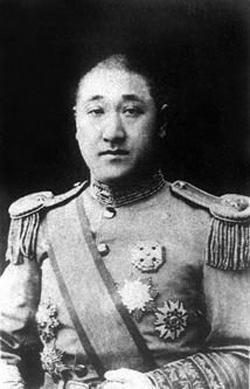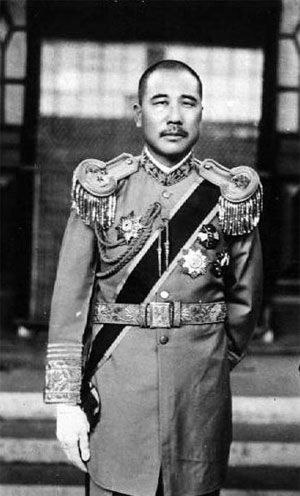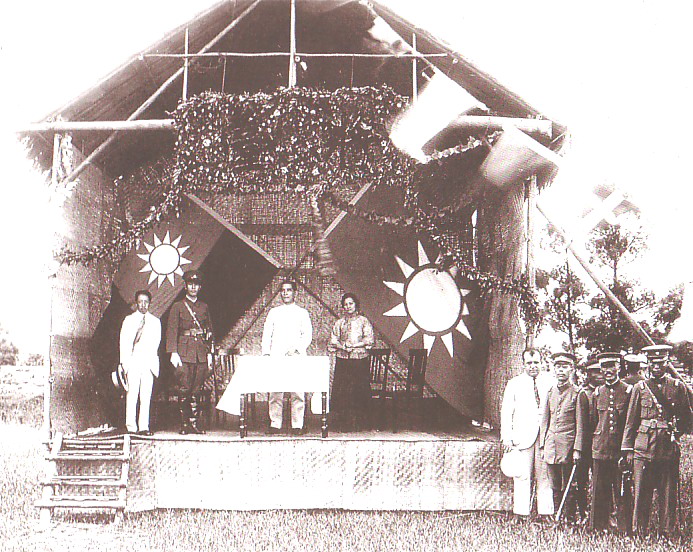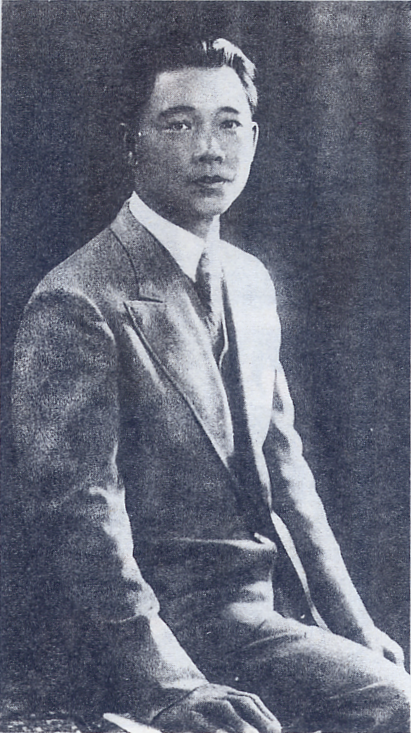|
Anti–Fengtian War
The Anti-Fengtian War () was the last major civil war within the Republic of China's northern Beiyang government prior to the Northern Expedition. It lasted from November 1925 to April 1926 and was waged by the Guominjun against the Fengtian clique and their Zhili clique allies. The war ended with the defeat of the Guominjun and the end of the provisional executive government. The war is also known as either Guominjun-Fengtian War (Guófèng zhànzhēng, 国奉战争), or the Third Zhili–Fengtian War (Dì sān cì zhífèng zhànzhēng, 第三次直奉战争). Cause The result of the Second Zhili–Fengtian War had led to the creation of a provisional executive government in Beijing in November 1924, where an informal triumvirate formed by Fengtian's Zhang Zuolin, the Guominjun's Feng Yuxiang and the Anhui clique's Duan Qirui had ruled. Duan's position as head of state was merely as a figurehead, however, as his clique had been almost destroyed. His small army of bodyguar ... [...More Info...] [...Related Items...] OR: [Wikipedia] [Google] [Baidu] |
Warlord Era
The Warlord Era was the period in the history of the Republic of China between 1916 and 1928, when control of the country was divided between rival Warlord, military cliques of the Beiyang Army and other regional factions. It began after the death of Yuan Shikai, the President of the Republic of China, President of China after the Xinhai Revolution had overthrown the Qing dynasty and established the Republic of China (1912–1949), Republic of China in 1912. Yuan's death on 6 June 1916 created a power vacuum which was filled by Warlord, military strongmen and widespread violence, chaos, and oppression. The Nationalist Kuomintang (KMT) government of Sun Yat-sen, based in Guangzhou, began to contest Yuan's Beiyang government based in Beijing for recognition as the legitimate government of China. The most powerful cliques were the Zhili clique led by Feng Guozhang, who controlled several northern provinces; the Anhui clique led by Duan Qirui, based in several southeastern provinces ... [...More Info...] [...Related Items...] OR: [Wikipedia] [Google] [Baidu] |
Anhui Clique
The Anhui clique () was a military and political organization, one of several mutually hostile cliques or factions that split from the Beiyang clique in the Republic of China's Warlord Era. It was named after Anhui province because several of its generals–including its founder, Duan Qirui–were born in Anhui. The clique's main members were Duan Qirui, Duan Zhigui, Jin Yunpeng, Wang Yitang, Lu Yongxiang, Zhang Jingyao, Wu Guangxin, Chen Shufan, Zheng Shiqi, Xu Shuzheng, etc. The Anhui Clique was largely a collection of military officers with connections to Duan Qirui, either due to family ties such as Wu Guangxin, being from the same locality such as Duan Zhigui, or having a teacher-student relationship such as Xu Shuzheng or Jin Yunpeng.Andrew J Nathan (1976). Peking politics, 1918-1923: factionalism and the failure of constitutionalism. University of Michigan Center for Chinese Studies. ISBN 978-0-89264-131-4. However, the Anhui Clique would grow to be defined ... [...More Info...] [...Related Items...] OR: [Wikipedia] [Google] [Baidu] |
March 18 Massacre
The March 18 Massacre (三·一八惨案) was a massacre that took place on 18 March 1926, amid an anti-warlord and anti-imperialist demonstration in Beijing, China. The date, March 18, was referred to by Chinese writer Lu Xun as the "darkest day since the founding of the Republic". Background In November 1925 the Anti-Fengtian War broke out in northern China between the Soviet-backed Guominjun and the Japanese-backed Fengtian clique. By early 1926 the war was going badly for the Guominjun and, on March 8, they blockaded and mined Dagu harbor in defense of Tianjin. On March 12 a Japanese warship bombarded the Taku Forts in support of the Fengtian offensive, killing several Guominjun troops guarding the forts. In retaliation, Guominjun troops fired back and drove the warship out of the Tanggu harbor. The act was treated by Japan as a violation of the Boxer Protocol, signed in 1901 in the aftermath of the Boxer Rebellion. Four days later, ambassadors representing eight countries ... [...More Info...] [...Related Items...] OR: [Wikipedia] [Google] [Baidu] |
Zhang Zongchang
Zhang Zongchang (; also romanized as Chang Tsung-chang; 1881 – 3 September 1932), courtesy name Xiaokun, was a Chinese warlord who ruled Shandong from 1925 to 1928. A member of the Fengtian clique, Zhang was notorious for his brutal and ruthless behavior, eccentric personality, and extravagant lifestyle, which earned him nicknames such as the "Dogmeat General"; ''Time'' dubbed him China's "basest warlord". Zhang's troops were defeated by the National Revolutionary Army during the Northern Expedition in 1928, and he fled to Japan before returning to Shandong in 1932, where he was assassinated by a young officer. Biography Early life and career Zhang was born in 1881 in Yi County (now Laizhou) in Shandong. His family was poor. Zhang's father worked as a head shaver and trumpeter, and was an alcoholic. His mother was an exorcist and "practicing witch". His parents eventually separated. Zhang stayed with his mother who had taken a new lover. In his teens, Zhang's family mov ... [...More Info...] [...Related Items...] OR: [Wikipedia] [Google] [Baidu] |
Whampoa Clique
The Republic of China Military Academy ( zh, t=中華民國陸軍軍官學校, p=Zhōnghúa Mīngúo Lùjūn Jūnguān Xúexiào, poj=Tiong-hôa Bîn-kok Lio̍k-kun Kun-koaⁿ Ha̍k-hāu), also known as the Chinese Military Academy (CMA), is the service academy for the Republic of China Army. It was founded by the Republic of China as the Whampoa Military Academy at Huangpu (Whampoa), Guangzhou in 1924. At the end of the Chinese Civil War the academy evacuated to the island of Taiwan and took its current name. Its graduates participated in the Northern Expedition, the Second Sino-Japanese War and the Chinese Civil War. Establishment By 1924, the Kuomintang (KMT) wanted to build a modern, and politically reliable armed force. The KMT received money, materiel, and advisors from the Soviet Union; military advisors provided training and began reorganizing the KMT's forces along Soviet lines. As part of the reforms, political commissars were introduced for political and techni ... [...More Info...] [...Related Items...] OR: [Wikipedia] [Google] [Baidu] |
Wang Jingwei
Wang Zhaoming (4 May 188310 November 1944), widely known by his pen name Wang Jingwei, was a Chinese politician who was president of the Reorganized National Government of the Republic of China, a puppet state of the Empire of Japan. He was initially a member of the Socialist ideology of the Kuomintang, left wing of the Kuomintang (KMT), leading a Government of the Republic of China in Wuhan, government in Wuhan in opposition to the right-wing Nationalist government in Nanjing, but later became increasingly anti-communist after his efforts to collaborate with the Chinese Communist Party ended in political failure. Wang was a close associate of Sun Yat-sen for the last twenty years of Sun's life. After Sun's death in 1925, Wang engaged in a political struggle with Chiang Kai-shek for control over the Kuomintang, but lost. Wang remained inside the Kuomintang, but continued to have disagreements with Chiang. Following the outbreak of the Second Sino-Japanese War in 1937, Wang acce ... [...More Info...] [...Related Items...] OR: [Wikipedia] [Google] [Baidu] |
Kuomintang
The Kuomintang (KMT) is a major political party in the Republic of China (Taiwan). It was the one party state, sole ruling party of the country Republic of China (1912-1949), during its rule from 1927 to 1949 in Mainland China until Retreat of the government of the Republic of China to Taiwan, its relocation to Taiwan, and in Taiwan Martial law in Taiwan, ruled under martial law until 1987. The KMT is a Centre-right politics, centre-right to Right-wing politics, right-wing party and the largest in the Pan-Blue Coalition, one of the two main political groups in Taiwan. Its primary rival is the Democratic Progressive Party (DPP), the largest party in the Pan-Green Coalition. As of 2025, the KMT is the largest single party in the Legislative Yuan and is chaired by Eric Chu. The party was founded by Sun Yat-sen in 1894 in Honolulu, Hawaii, as the Revive China Society. He reformed the party in 1919 in the Shanghai French Concession under its current name. From 1926 to 1928, the K ... [...More Info...] [...Related Items...] OR: [Wikipedia] [Google] [Baidu] |
Sun Chuanfang
Sun Chuanfang () (April 17, 1885 – November 13, 1935) was a Chinese warlord in the Zhili clique and protégé of the "Jade Marshal" Wu Peifu. Early life and education Sun Chuanfang was born in Licheng District, Jinan, Licheng, Shandong Province. Wang Yingkai, a rising officer in the Beiyang Army and protégé of Yuan Shikai, the commander of the Beiyang Army, married Sun's sister, and Sun took advantage of his brother-in-law's position and joined a training camp in 1902. Wang later recommended Sun to Tianjin Military Academy because of the latter's outstanding capabilities; in 1904 he also sent Sun abroad to Empire of Japan, Japan for more education at the Tokyo Shimbu Gakko, a military preparatory school. Sun eventually graduated from the sixth class of the Imperial Japanese Army Academy and returned to China in 1908. Upon his return from Japan, Wang and his political ally, Tie Liang, happened to be the ones presiding over the examination aimed at testing fresh graduate ... [...More Info...] [...Related Items...] OR: [Wikipedia] [Google] [Baidu] |
Mukden
Shenyang,; ; Mandarin pronunciation: ; formerly known as Fengtian formerly known by its Manchu name Mukden, is a sub-provincial city in China and the provincial capital of Liaoning province. It is the province's most populous city with a population of 9,070,093 as of the 2020 census, also making it the largest city in Northeast China by urban population, and the second-largest by metropolitan population (behind Harbin). The Shenyang metropolitan area is one of the major megalopolises in China, with a population of over 23 million. The city's administrative region includes the ten metropolitan districts, the county-level city of Xinmin, and the counties of Kangping and Faku. Shenyang has been controlled by numerous different states and peoples during its history. In the 14th century, the city came under the control of the Ming dynasty (1368–1644), for whom it served as an important military stronghold. The 1621 Battle of Shen-Liao resulted in Shenyang briefly servin ... [...More Info...] [...Related Items...] OR: [Wikipedia] [Google] [Baidu] |
Guo Songling
Guo Songling () (1883 – 25 December 1925) was a Chinese general who served in the Fengtian Army under Zhang Zuolin during the Chinese Warlord Era. A republican sympathiser who briefly served under Sun Yat-Sen, he was a teacher of and an important influence on Zhang Zuolin's son, Zhang Xueliang. Citing desire to avoid civil war, he led a three-month rebellion against Zhang Zuolin which led to his defeat and execution. Youth and formative years Guo Songling was born in 1883 in a village on the outskirts of Mukden, the capital of Fengtian Province, Qing China, which is modern day Shengyang, with a traditional ancestral hometown of Taiyuan in Central China. In 1905, the Viceroy of Manchuria Zhao Erxun set up the Fengtian Primary Army School, to which 22 year old Guo Songling was admitted. On high marks, he was recommended the following year to enter the Baoding Military Academy, Northern China's premier military academy. In 1907, he graduated and joined the Qing Dynasty ... [...More Info...] [...Related Items...] OR: [Wikipedia] [Google] [Baidu] |
Zhang Xueliang In Nankou
Zhang may refer to: Chinese culture, etc. * Zhang (surname) (張/张), common Chinese surname ** Zhang (surname 章), a rarer Chinese surname * Zhang County (漳县), of Dingxi, Gansu * Zhang River (漳河), a river flowing mainly in Henan * ''Zhang'' (unit) (丈), a traditional Chinese unit of length equal to 10 ''chi'' (3–3.7 m) * 璋, a type of shaped stone or jade object in ancient Chinese culture thought to hold great value and protective properties; see also Bi (jade) and Cong (jade) A ''cong'' () is a form of ancient Chinese jade artifact. It was later also used in ceramics. History The earliest ''cong'' were produced by the Xuejiagang culture and the Liangzhu culture ( 3400– 2250 BC); later examples date mainly fro ... Other * Zhang, the proper name of the star Upsilon¹ Hydrae See also * Zang (other) {{disambiguation, geo ... [...More Info...] [...Related Items...] OR: [Wikipedia] [Google] [Baidu] |







